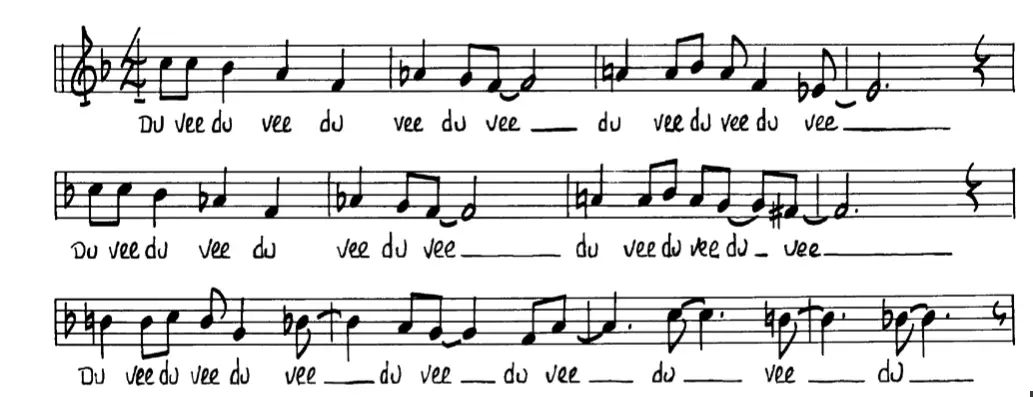Classical Indian music, the tradition of aakar, is used for vocal exercises and singing and added to the singing of melodies. Vocalese – the suffix refers to a kind of jazz singing in which new words are created and sung over existing instrumental improvisations. Therefore this style is not to be confused with scat singing, which is wordless improvisation (i.e. not improvisation).
Born out of bebop singing, in the 1950s some singers began to imitate the famous instrumental solos of the human voice.
The initial practice became known as vocalese and reached its peak in the 1960s with the likes of Ella Fitzgerald and Annie Oakley. The term is often used by jazz writers to describe the singing style of jazz greats such as Miles Davis, Miles Armstrong, John Coltrane, Bill Kreutzmann, and even the late Billie Holiday. She is considered the first singer in jazz history and one of the most influential artists.
In Armstrong’s recordings, and later Cab Calloway’s, Scat became a distinctive feature of jazz modernity, making it decidedly hip with syncopation, improvisation, and slanted playing. By using the voice as an instrument and not as a speaking medium, the singer can improvise melodies and rhythms. Melodic lines are a key element of improvised scats singing, as is the case with instrumental improvisers.
Instead of a singing form, it represents an important ideology of freedom of expression, which underpins the whole undertaking of jazz music making itself. Scat allows jazz singers to escape the lyrical straitjacket of meaning that comes with words. The singer receives the status of a solo instrumentalist like no other in jazz, and thus the vocal expression moves into a kind of meaning that is more musical than verbal.
Ella Fitzgerald delivered a sparkling performance in this version of “Flying Home,” and her improvisational approach was highly polished and refined. The famous Mel Torme is a great example of how to scat the classic jazz song “Autumn Leaves.”
In the world of classical music, these words can often be extended into what is called melisma. Some songs regularly use a single vowel to create a song that sounds like two opposite words or even two different words in the same song.
Perhaps the most famous song in the genre is Rachmaninov’s Vocalise op. Vocalisation is the act of singing one or more vocal sounds, and that is what composers have long demanded.
Marian Anderson is probably the most famous alto saxophone in history, but it declined rapidly at the turn of the 20th century. There are very rare voices, and they are usually only available in the form of a very small number of singers.
The singers, founded in 1982, delight their audiences with a season that includes works by composers such as Mozart, Beethoven, Bach and Bach. Greenstein is a New York-based composer who has written works for other prominent New Music ensembles, including yMusic and now this ensemble.
The singer Bobby McFerrin has taken up his passion for singing and transferred it to large ensembles of choral singing. The album features what he calls a voicestra ensemble, a group of professional singers from various fields, including singers from New York, Los Angeles, Chicago, London and New Jersey. It may sound like a word, but it’s actually a nonsense syllable.
Jan Shapiro takes us through the history of vocal jazz, from its origins to its modern incarnation. We look at the specific singers who influenced and even defined jazz as we know it today, and the unique way in which they have included it. How do you suggest that other types of singers use jazz and how can they do that? What makes the distinctive jazz singing unmistakable and what distinguishes it from other forms of singing?
The book contains a guest and written chapter on the history of the voice – singing in jazz and its role in the development of jazz music.
Indian classical music, the tradition of aakar was used for vocal exercises and before – singing and added to singing melodies. Therefore this style is not to be confused with scat singing, wordless improvisation. English suffixes, voccalese, mention a kind of jazz singing, in which new words are created and sung over existing instrumental improvisations.
My passion for singing sparked when I played a small part in my high school play. Although I was terrible at it, there was a sense of liberation that washed over me.
Ever since that moment I have been practicing on perfecting my skill and I’m lucky enough to build a career out of it! I have sung on several movie sound tracks, contracted choirs for films, and has been teaching voice and piano in the Atlanta area for over 10 years.
I want to help people understand the fundamentals of singing, how to prepare the voice and keep it strong for performances, how to juggle singing with a jam-packed schedule, and the need to operate on a budget.

